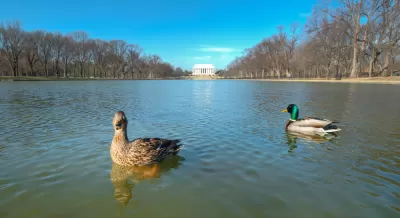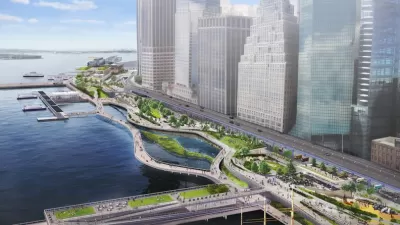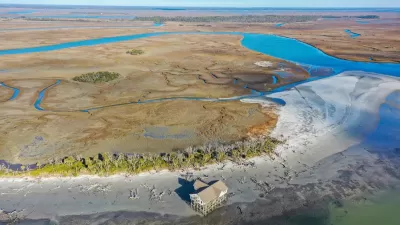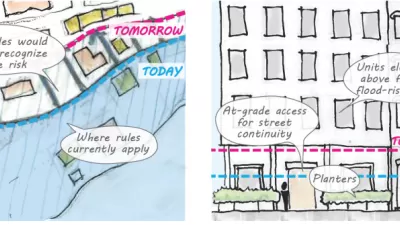The D.C. Department of Energy and Environment has read the writing on the wall.

"A DC agency is considering changes to the city's floodplain regulations which would restrict construction in areas expected to be underwater in 2100," reports Nena Perry-Brown.
Namely, the Department of Energy and Environment (DOEE) "may amend its Flood Hazard Rules to expand the agency's purview over DC's floodplain, covering the 500-year floodplain rather than just the 100-year," according to Perry-Brown.
Those initial steps could all be prelude for an eventual decision by the DOEE to restrict development within the high tide mark—areas that are expected to be underwater by 2100.
"DOEE's proposed changes were included as part of a zoning application the Office of Planning (OP) filed to remove use prohibitions within the 100-year floodplain from the zoning code," adds Perry-Brown.
FULL STORY: DC Agency May Restrict Construction in Areas That May Eventually Be Underwater

Study: Maui’s Plan to Convert Vacation Rentals to Long-Term Housing Could Cause Nearly $1 Billion Economic Loss
The plan would reduce visitor accommodation by 25,% resulting in 1,900 jobs lost.

North Texas Transit Leaders Tout Benefits of TOD for Growing Region
At a summit focused on transit-oriented development, policymakers discussed how North Texas’ expanded light rail system can serve as a tool for economic growth.

Using Old Oil and Gas Wells for Green Energy Storage
Penn State researchers have found that repurposing abandoned oil and gas wells for geothermal-assisted compressed-air energy storage can boost efficiency, reduce environmental risks, and support clean energy and job transitions.

Private Donations Propel Early Restoration of Palisades Playground
Los Angeles has secured over $1.3 million in private funding to restore the Pacific Palisades playground months ahead of schedule, creating a modern, accessible space that supports community healing after recent wildfires.

From Blight to Benefit: Early Results From California’s Equitable Cleanup Program
The Equitable Community Revitalization Grant (ECRG) program is reshaping brownfield redevelopment by prioritizing projects in low-income and environmental justice communities, emphasizing equity, transparency, and community benefits.

Planting Relief: Tackling Las Vegas Heat One Tree at a Time
Nevada Plants, a Las Vegas-based nonprofit, is combating the city’s extreme urban heat by giving away trees to residents in underserved neighborhoods, promoting shade, sustainability, and community health.
Urban Design for Planners 1: Software Tools
This six-course series explores essential urban design concepts using open source software and equips planners with the tools they need to participate fully in the urban design process.
Planning for Universal Design
Learn the tools for implementing Universal Design in planning regulations.
Ascent Environmental
Borough of Carlisle
Institute for Housing and Urban Development Studies (IHS)
City of Grandview
Harvard GSD Executive Education
Toledo-Lucas County Plan Commissions
Salt Lake City
NYU Wagner Graduate School of Public Service





























